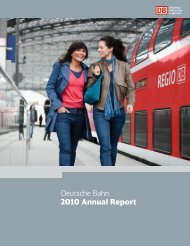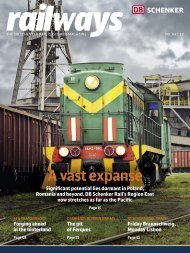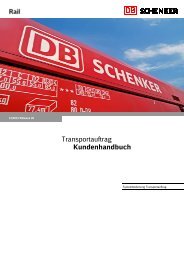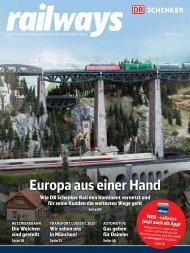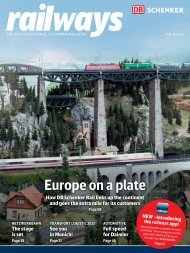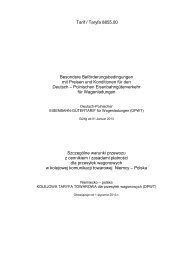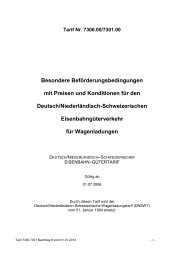PDF Download
PDF Download
PDF Download
Create successful ePaper yourself
Turn your PDF publications into a flip-book with our unique Google optimized e-Paper software.
On the Move<br />
Charlie Maddocks is Head of Disposals and<br />
Retrofit at DB Schenker Rail (UK) in Toton,<br />
Nottinghamshire.<br />
Five servings at once<br />
Charlie Maddocks explains the linguistic and cultural differences that face<br />
Brits in Germany.<br />
Photos: Tobias Thomassetti/Stock4B, DB Schenker<br />
The most noticeable difference between Germany and<br />
the UK is the amount of German people you meet that<br />
speak really great English whether it be in a shop, train<br />
station or on the telephone! But if a German person<br />
hears a UK accent, then many immediately switch to English,<br />
which, whilst being helpful, does not give us much<br />
chance to practise our ever growing vocabulary.<br />
A lack of practice in using the language can lead to<br />
some amusing misunderstandings. Once I ordered a<br />
beer for myself and my colleagues in German at a pub<br />
in Mainz; the waitress obviously understood something<br />
completely different from what I was trying to say, as<br />
she brought twice as many beers as I had actually wanted.<br />
The situation was similarly difficult for an English<br />
colleague who ordered a dish in a restaurant in his still<br />
somewhat basic German. Imagine his surprise when the<br />
waiter appeared with five servings.<br />
I now have German lessons once a week and I am<br />
slowing improving although my accent does give my<br />
German colleagues some amusement at times! But this<br />
is an improvement on my first trip to Germany when I<br />
hardly knew any of the language at all! I found myself<br />
worrying that I might board the wrong train at Frankfurt<br />
Airport, imagine my relief when the train did actually<br />
stop at Römisches Theater station in Mainz. However,<br />
once I was sitting in a compartment on a train when a<br />
lengthy announcement that I did not understand came<br />
over the PA. Gradually, all the other passengers left the<br />
train until there was only me left. So I finally also got off<br />
– just in time before the train was towed off to the repair<br />
shop. But that would never happen now!!<br />
Nor should the differences in etiquette be underestimated<br />
by Brits working in Germany. Whereas it is common<br />
in the UK for colleagues to call each other by their<br />
first names , in Germany it is usual to address colleagues<br />
as „Herr X“ and „Frau Y“ – but we are getting used to<br />
this now. The Germans are also much more formal when<br />
it comes to meetings: in Germany, you draw up an agenda<br />
and invite people to a meeting, whereas in the UK we<br />
tend to be more informal in our approach where a quick<br />
conversation on the phone or a brief hastily arranged<br />
chat around the desk may suffice in some cases.<br />
Whilst Germans may be a little more formal at work,<br />
the opposite is true at public celebrations. Last year, I<br />
was in Mainz for the start of the carnival season on 11<br />
November, and the streets were full of people wearing<br />
fancy dress and drinking – it reminded me of some of the<br />
carnivals in the UK, especially Nottinghill with it’s lively,<br />
fun atmosphere.<br />
But apart from these two diverse situations of work<br />
and carnival, Germany has many things in common with<br />
the UK: the people are friendly, the scenery is magnificent<br />
and there is a rich cultural life. I am determined to<br />
work hard at my German language so that I can become<br />
even more involved in that life and gain a greater understanding<br />
of the culture.<br />
RAILWAYS | 35



